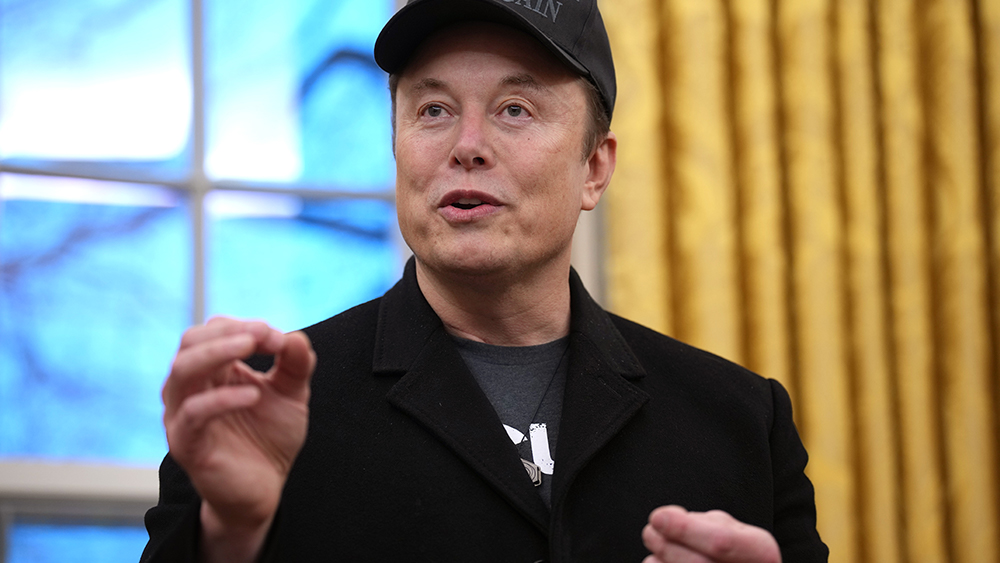DOGE unveils $400M unemployment fraud scandal: Toddlers, futuristic birthdates fuel outcry
By willowt // 2025-04-12
Tweet
Share
Copy

- Elon Musk and Trump’s DOGE uncovered a $400M fraud scheme in the U.S. unemployment system, including absurd claims like payments to toddlers, people born in 2040 or later, and individuals older than 115 (beyond documented human lifespans).
- The report blames outdated verification systems and lax oversight, exacerbated by pandemic-era strains, revealing either coordinated fraud or gross negligence in state/federal programs.
- DOGE defends its aggressive audits, arguing transparency outweighs privacy risks (e.g., leaked Social Security numbers, which critics claim are already available on the dark web). Skeptics argue findings may reflect data-entry errors rather than fraud, and warn of overreach or innocent exposure.
- The scandal fuels debates over fiscal accountability, with DOGE positioned as a tool to "clean up" government. However, concerns linger about partisan targeting and collateral damage to legitimate programs.
The fraudulent claims: A system in collapse
DOGE’s audit uncovered jaw-dropping anomalies, including 59 million paid to 24,500 individuals listed as older than 115 — a group decades beyond the documented age of the oldest living American. Some claims reached absurdist extremes: 28,000 children aged 1 to 5 received 254 million in benefits, while 9,700 applicants with birthdates set in 2040 or later collected 69 million. One case listed a birth year of 2154 and netted a 41,000 payout. “The oldest living American is 114 years old, so it is safe to say that anyone 115 or older is collecting unemployment due to being dead. There was no sanity check for impossibly young or impossibly old people,” Musk wrote on X, describing the findings as “so crazy” he needed “to read it several times before it sank in.” DOGE attributes these errors to outdated identity verification protocols and lax monitoring. Unemployment insurance, administered by states and partially under federal oversight, was already strained by pandemic-era surges. However, Musk and his team argue the scale of these irregularities points to coordinated fraud or gross negligence.Political fury and accountability push
The revelation has ignited bipartisan outrage, though the response has divided along ideological lines. Trump allies framed the scandal as proof of government incompetence, while critics questioned the transparency of DOGE’s methodology. “This is another incredible discovery by the DOGE team,” said Department of Labor Secretary Lori Chavez-DeRemer in a statement to Fox News Digital. “We will catch these thieves and keep working to root out egregious fraud — accountability is here.” Senator Mike Lee (R-UT) vented on social media: “Reckless incompetence.” DOGE, launched in 2025 under Trump’s executive order, has aggressively targeted waste in federal programs, but its methods have drawn scrutiny. Critics argue its audits could expose sensitive data like Social Security numbers. DOGE counters that such information is already accessible through the dark web, emphasizing transparency as a national security imperative.Skeptics question overreach and errors
While DOGE insists on accountability, some analysts and social media users have raised doubts about the findings’ scope and potential oversights. Kristjan Backman, a data analyst, argued on X that the figures likely reflect routine data-entry errors, not organized fraud: “The amount of bad data is less than you would expect for the volume of entries… it’s a general garbage in, garbage out problem.” Others, like Tom Hennessy, pushed for prosecution: “If this is illegal, why aren’t we seeing people prosecuted at scale?” Meanwhile, getUsername=Stephen Richardson conspiracy suggests coordination among officials: “This sounds like a major government money-laundering scam.” DOGE has not yet disclosed the source of its data, leaving some to question whether the fraud claims may overstate the issue or inadvertently expose innocent citizens’ private information.Why this matters: A decade of fiscal neglect
The unemployment fraud scandal is the latest chapter in a decades-long debate over federal program accountability. After the 2020 recession, states urgently expanded unemployment benefits, but oversight gaps created vulnerabilities exploited by fraudsters. Trump’s re-election campaign framed incompetent bureaucracy as a core issue, promising DOGE to “make government honest again.” The new agency has now delivered a headline-grabbing win, but its targets often conflict with liberal priorities, such as slashing environmental and Medicare budgets. “For too long, Washington has been corrupt, and we’re finally shining light into the darkest corners,” Musk told X followers. The fallout could reshape public trust in the federal workforce, especially as DOGE prepares broader recovery efforts. However, skepticism persists over whether audits will reverse systemic issues without collateral damage to legitimate programs.Conclusion
The $400 million unemployment fraud revelations, while shocking, reaffirm the political stakes of federal accountability. While DOGE’s campaign has unearthed “rot,” as Trump puts it, it has also rekindled debates over systemic reform versus bureaucratic overreach. As Musk prepares to exit his advisory role amid his tech empire’s demands, the spotlight remains on whether transparency can outpace politicization—or if the quest for efficiency will fracture under partisan rivalry. For now, the American taxpayer is left to wonder: Who else has been shortchanged? And who gets to decide? Sources include: YourNews.com Newsweek.com NYPost.comTweet
Share
Copy
Tagged Under:
Elon Musk Donald Trump fraud corruption conspiracy big government deception money laundering rigged insanity incompetence money supply pensions progress government debt real investigations faked unemployment benefits gross negligence DOGE
You Might Also Like
Criminal referral requests filed against Fauci and top COVID officials in seven states
By Willow Tohi // Share
U.S.-funded “anti-misinformation” groups persist, raising concerns over censorship and bias
By Willow Tohi // Share
Trump to impose major tariffs on foreign-made pharmaceuticals
By Laura Harris // Share
EU pauses retaliatory tariffs as Trump temporarily halts new duties
By Willow Tohi // Share
“Breaking Banks” explores the digital transformation of finance
By Belle Carter // Share
Recent News
Tesla halts U.S.-made Model S and X orders in China amid escalating trade war
By isabelle // Share








